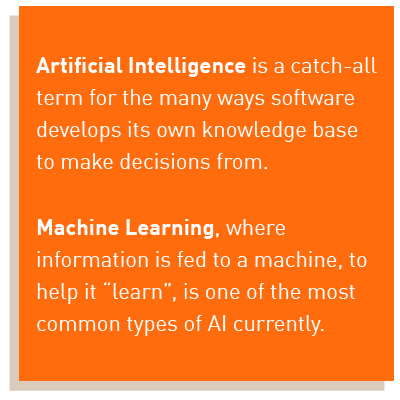How Cloud Accounting Uses AI and Machine Learning
| Cloud accounting has become a popular choice for small and medium-sized businesses to manage their finances. While there are a number of advantages that come with cloud accounting software such as ease of use and the ability to collaborate with remote employees, there’s one feature that stands out above all others: machine learning integration.
How can machine learning (ML) supercharge your cloud accounting software? We’ve pulled together the top five ways below.
|
 |
1. Audits and compliance
Audits and compliance are two of the biggest headaches for any business. They’re time-consuming, tedious, and expensive — and that’s before you even begin to think about how much time it takes to prepare your books for an audit or review. Luckily, AI can help you here!
AI-powered auditing tools can comb through your historical data to look for discrepancies between accounts (or anything else) so that they can be flagged before they become problems later on.
AI-powered tax compliance tools can automatically generate all the required reports based on your company’s business model, ensuring that you always have these documents ready when needed most: during tax season! As an added bonus there likely won’t be any human error either because everything has been checked multiple times over by machines instead.
2. Budgeting and forecasting
Budgeting and forecasting are both important aspects of accounting. In the case of budgeting, you need to predict future costs and revenue so that you can realistically plan ahead. With forecasting, you can analyze historical data to predict future trends in sales and costs.
Both are good candidates for machine learning because they require users to review large amounts of data and make decisions based on that data. They also involve mathematical modeling, which can be automated using machine learning algorithms.
3. Invoicing and cash flow
Invoice automation is one of the biggest benefits of cloud accounting. With a few clicks, you can generate invoices and send them out to your customers by email.
You can even automate payment reminders — so if a customer’s payment is overdue, you know instantly and can take action accordingly. The same goes for invoice follow-ups: when it comes time to collect unpaid debts, an AI-powered system will ensure that your reminders are sent out automatically and on time every single month. This way there’s no need to worry about missing deadlines or forgetting important details like interest charges or late fees.
You might also want an AI-powered system in order to generate invoices automatically based on the information in your accounting software (such as itemized receipts), which lets you save time without sacrificing accuracy or quality control over what gets sent out each month.
Sage Intacct leverages ML to help automate and streamline tasks of importance, like accounting functions.
4. Spend management
Spend management is a process that identifies and assesses the costs of all of the products, services, and activities that make up your business. It will help you to identify areas where you can save money and help you to understand where your money is being spent.
Cloud accounting software can be integrated with spend management tools. Cloud accounting software also has built-in finance tools like accounts payable automation so companies don’t have to worry about having enough cash on hand for every invoice they receive.
5. Data security
As with any powerful tool, machine learning can be dangerous if used improperly. To protect your data from falling into the wrong hands, it’s crucial to train your algorithms on accurate and relevant data.
A few other key points that are essential for ensuring the privacy and security of customer data include:
- Regular audits to ensure that data is being used appropriately
- User permission requirements before personal information is released or shared
- Encryption of all customer files
Increase efficiency and free up your time with machine learning
Machine learning, when properly integrated into your accounting software, has the potential to increase efficiency and free up your time so you can focus on growing your business.
Machine learning allows for more accurate data and analysis, which leads to better management. With the increased accuracy of your accounting software, you can spend less time on administrative tasks and focus on growing your business.
Ready to see what AI-powered cloud accounting software can do for your business? Start the conversation with our tech stack experts.
